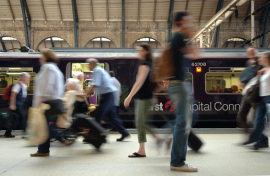As I sit writing this month’s editorial, I’m riding on a London Midland train heading into London mid-afternoon, on a Thursday – ready for a major bid presentation with a client. It’s a timely reminder of the current market, where a lot of effort has been put in to get to this stage. The final decision will ultimately be made on the back of each suppliers pitch; bid submission and ability to convey ‘they/we’ meet and exceed the client’s expectations.
We spend an awful lot of time keeping track of the latest thinking, and keep ahead of our clients competitors. You must do the same? The only way to win work in these austere times, is to first meet the client’s brief explicitly, then offer guidance and explore alternative bid solutions and act responsibly when the order has been placed.
At Rail Champions we also work with some very inspirational people, from all quarters of the industry. So it comes as no surprise we want to investigate the procurement strategies emerging in the rail sector – which brings me to the Platform Sessions at Railtex, and why we would like to invite you to attend these interactive sessions.
Our vision at the very start was to explore and investigate key topics that regularly feature in the rail press, creep into tenders and may offer suppliers an insight into the changing commercial landscape – it may just help your organization win more work too!
We are delighted to have twelve experts leading the discussions, including Paul Zanelli (Head of R&D) from Network Rail, Chris Leech MBE (National Account Manager) from Business in the Community (BITC), and Richard Graham (Head of Strategic Development) from Balfour Beatty Rail to name but a few. Each panelist will share their thoughts and answer questions from the floor on Transformation, Sustainability (CSR) and Innovation.
The back-story to these topics is simple. Suppliers these days are seeking to match the needs of an ever more informed client, which may lead to new opportunities to refine technologies and deliver a more efficient service. Can this actually be achieved whilst the UK is in the grip of the worst recession in 50 years? There has been cost cutting, loss of skilled labour and increased competition from new suppliers entering the marketplace. Nobody said it was easy.
Asset rich operators and maintainers are demanding incremental benefits from suppliers and employing ‘whole life cost’ analysis which we believe is a positive step forward, and something Network Rail have built into Control Period 5 (CP5).
Why is this an important step? A benchmark study completed back in 1998 found that construction projects exceeded their budgets by 50%. Hence the need for tight control and precise communication throughout the project life-cycle and in the supply chain.
Thankfully times have changed, and now we are benefiting from robust tenders, that offer better outline designs, take account of running costs, offer a clear brief and simple payment terms are yielding significant results.
Testament to this new way of thinking was the completion of the East London Line Project with gave London its first orbital railway in 2010. The project came in on time and to budget. The new infrastructure transformed London and indeed the East End, billed as the ‘regeneration railway’. Improving the access of a number of deprived areas to a wider job market.
Whilst it is great to celebrate these past successes, there are new challenges ahead. We are moving into a new era of the ‘knowledge age’ so it’s becoming popular to share ideas and be open to collaboration and open innovation.
Remember too that old habits die hard. In a recent report by TfL, there was reference to the ill-fated West London Tram, where £34 million was casually spent on drawings and consultancy for the West London Tram, which had no chance of happening. It was postponed indefinitely in 2007.
Transport operators are serious about both sustainability and innovation – so should you be. Both subjects are inextricably linked. As key players in the rail supply chain, organizations like yours are encouraged to co-create the next generation of products and services.
We believe its not just about generating profits or great ideas. It’s also about solving real life problems. About continuous engagement and motivation to do better. That means: embedding Corporate Social Responsibility (CSR) in to our daily lives.
Back to reality, and I’m just passing Edgeware Road Tube station, and recall that if the hole-punch signalling equipment goes wrong down there, then 250,000 passenger journeys are disrupted. Added to which 40% of our trains running up and down the UK are now past their expected lifespan. There are so many areas of opportunity to deliver a lasting change, but it all begins with people: and great ideas.
If you want to continue the discussion, lets meet at The Platform Sessions, which run from 30 April to 2nd May at Railtex.
